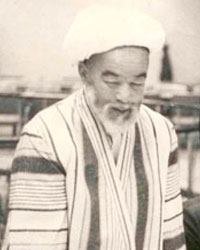SHARE WITH FRIENDS:
 Sheikh Ismail Makhdum was born in 1893 in Namangan in a religious family. His father Mullo Sotti Akhund Mullo Abduroziq Akhund oglu was one of the famous scholars of his time, he was an imam at the Hazrati Hizr mosque in Namangan for many years and also taught at the madrasah next to the mosque. The family had five sons and three daughters, Ismail Makhdum was the second child. His brothers Ibrahim Makhdum and his brother Ishaq Makhdum are scholars and have served as imam-khatibs in many mosques in Uzbekistan for many years.
Sheikh Ismail Makhdum was born in 1893 in Namangan in a religious family. His father Mullo Sotti Akhund Mullo Abduroziq Akhund oglu was one of the famous scholars of his time, he was an imam at the Hazrati Hizr mosque in Namangan for many years and also taught at the madrasah next to the mosque. The family had five sons and three daughters, Ismail Makhdum was the second child. His brothers Ibrahim Makhdum and his brother Ishaq Makhdum are scholars and have served as imam-khatibs in many mosques in Uzbekistan for many years.
Ismail Mahdum received his primary education from his father and a local religious school. At the age of thirteen, the famous Ghafir qori teacher in Namangan completed and memorized the entire Qur'an and became one of the prominent memorizers of the Qur'an. Among the students who studied at the Mullo Kyrgyz Madrasah, they stood out for their intelligence and protective powers. Ismail Makhdum took lessons in tafsir, hadith, fiqh, spending and grammar from the famous Sabitkhan Tora and other teachers.
Ismail Makhdum took an active part in the establishment of the Muslim Religious Board of Central Asia and Kazakhstan in 1943, the opening of mosques and the Bukhara Mir Mir Madrasah, the only religious school in the former Soviet Union until 1974. In 1943, the first chairmen of the religious department took part in the first pilgrimage led by Mufti Eshan Babakhan ibn Abdulmajidkhan. This was the first pilgrimage allowed during the Soviet era.
During these years, Ismail Makhdum worked as an imam-khatib at the Sheikh Eshon Mosque in Namangan, and from 1952 he worked as a muhtasib in the Central Asian and Kazakh Muslim Religious Board, and then as a director at the Mir Arab Madrasa in Bukhara. From 1957 to the end of his life he served as Deputy Chairman of the Board - Judge. During this period, they have made a worthy contribution to all areas of religious activity.
Ismail Makhdum paid great attention to the educational work of the Mir Arab Madrasah in Bukhara and then to the Imam Bukhari Madrasah in Tashkent, which was established in 1974, and continued to teach tafsir, hadith, jurisprudence and other religious subjects at the madrasah until the end of his life. Many of his students are currently working in high religious positions in the Central Asian republics, Tatarstan, Bashkortostan and other regions of Russia, as well as in Azerbaijan. Until the end of their lives, they compiled and published a calendar of the religious administration.
Ismail Mahdum was in charge of editing the Qur'an, which has been published several times by the religious establishment. During his tenure as Deputy Mufti, he participated in business trips and official groups to Asia, Africa and Europe to establish friendly relations with foreign countries, where he met with heads of major religious institutions, government officials, prominent religious scholars and members of the public. Ismail Makhdum made a great contribution to the establishment of the exchange of letters.
Sheikh Ismail Mahdum was also instrumental in addressing pressing religious issues in the lives of Muslims and developing fatwas. Many problems were solved in their place without seeing a book. He was one of the founders of the Muslim Muslims of the Soviet East, and his articles on tafsir, hadith, and jurisprudence were regularly published. Sheikh Ismail Mahdum led the pilgrims six times and performed the blessed pilgrimage.
Sheikh Ismail Makhdum died on January 1976, 22 in Tashkent.
Famous and selfless people, including clergymen, who gained independence from Uzbekistan and grew up in our country due to independence, are being awarded. The people of Namangan and the city administration took into account the services of Sheikh Ismail Makhdum and named the street where he was born and raised and the mosque on this street Sheikh Ismail Makhdum.
Sheikh Ismail Makhdum was not only a religious figure, but also an expert in the history, culture and literature of the Arab, Iranian and Central Asian peoples, fluent in Arabic, Persian and ancient Uzbek. In addition, he was well versed in the sources of medicine, philosophy, and astronomy. He was also able to prepare medicines based on the ancient method of medicine, that is, medicine. Ismail Makhdum, Academician of the Academy of Sciences of Uzbekistan IM Muminov, famous scientists of the Institute of Oriental Studies of the Academy, corresponding members of the Academy U. Karimov, PG Bulgakov, associate professor of the eastern faculty of Tashkent State University, author of the "Arabic language textbook" (in Russian), had close relations with the late BZ Khalidov. The author of the work on the mummy M. Muminov also received a lot of advice from Ismail Makhdum.
Ismatulloh Abdulloh